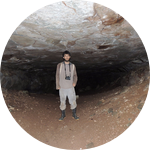About This Project
The harvestmen (Opiliones) are highly endemic in Atlantic Forest and are a good models for ecological and biogeographical studies. However, very little is known about harvestman ecology. This project aims to inventory the harvestmen fauna inan area of Atlantic Forest in Sergipe state, Brazil, a place to which the harvestmen fauna is unknown. I also pretend to identify the historical and environments factors that influence the distribution of these animals.
Ask the Scientists
Join The DiscussionWhat is the context of this research?
This project is part of my doctoral thesis entitled: "Biogeography of harvestmen in the Atlantic Forest: diversity patterns". Understanding the diversity and distribution patterns of the species of harvestmen can provide important information about biogeography and help us understand the history of the Brazilian Atlantic Forest. The Opiliones have low dispersion capacity and struggle to colonize new environments. In the Atlantic Rainforest, harvestmen have high rates of endemism and are restricted to habitats with high humidity.
What is the significance of this project?
The harvestmen fauna at the Crasto Ecological Reserve in Atlantic Forest, Brazil, is unknown, therefore, it is necessary to inventory the area. This project will contribute to the increase of knowledge about the harvestmen of the brazilian Atlantic Forest, as well as the ecology of the group and historical factors that have affected the distribution of these organisms. The list of species generated from this expedition will be used to delimit areas of endemism and propose priority areas for conservation.
What are the goals of the project?
This project aims: to inventory the harvestmen of the Crasto Ecological Reserve (Sergipe State, Brazil); to compare the richness and diversity of harvestmen between another areas in the biome; to relate the patterns observed with climatic and geographical variables (i.e. air air temperature, altitude, relative air humidity, rainfall index); to verify which microclimate and microhabitat variables (i.e. leaf litter depth, leaf litter cover, herbaceous vegetation cover, fallen logs in decomposition, leaf litter temperature) influence the harvestmen distribution and to verify if there are areas of endemism for harvestmen not yet defined.
Budget
Through this resource I will be able to carry out a field expedition to the Crasto Ecological Reserve (Sergipe state, Brazil) to sampling the harvestmen and measure the environmental variables. This is the only field expedition I need to complete my project. This resource will be used to help with the cost of travel to the sergipe state (I live in another state) which includes car rentals and lodging for a team of 4 people. In addition, the requested alcohol will be used to conserve the sampled animals.
Endorsed by
 Project Timeline
Project Timeline
I intend to perform the harvestmen sampling at the beginning of February and later to identify the individuals in the lab to be able to start the analyzes. This is the last sampling necessary to be able to carry out the statistical analyzes together with the other areas of Atlantic forest sampled.
Jan 09, 2018
Project Launched
Mar 08, 2018
Harvestmen sampling at Crasto Ecological Reserve
Mar 08, 2018
Measure of environmental variables
Mar 20, 2018
Harvestmen identification
Mar 20, 2018
Statistical analyzes
Meet the Team
Alessandra de Andrade
Master in Ecology and Biomonitoring by Federal University of Bahia, Brazil.
Doctorate student in Ecology by Federal University of Bahia, Brazil. The aim of my research is to understand the historical and ecological factors that influence the diversity patterns of harvestmen (Arachnida: Opiliones) in the Atlantic Rainforest.
Works with the following topics: biogeography, harvestmen ecology, biodiversity, population ecology, forest fragmentation and conservation.
Here are some of my publications:
New articles: Peres et al., 2017. International Journal of Research Studies in Biosciences / Benati et al., 2017. International Journal of Research Studies in Biosciences
Pinheiro-Passos et al., 2016. Check List v2, n1.
Gondim-Silva et al., 2016.Biota Neotropica, v16, n3.
Melo et al., 2016. Conservation Evidence, v.16.
Melo et al., 2015. Latin American Journal of Business Management v6, n3.
Andrade et al., 2009. Sitientibus v9, n3.
Curriculum: http://buscatextual.cnpq.br/bu...
Project Backers
- 18Backers
- 100%Funded
- $544Total Donations
- $30.22Average Donation

